| |||||||||||||
| |||||||||||||
| |||||||||||||
The 1976 Liberal Party leadership election was called following the resignation of Jeremy Thorpe in the wake of allegations which would eventually lead to Thorpe's trial and acquittal for conspiracy to murder in 1979.
| |||||||||||||
| |||||||||||||
| |||||||||||||
The 1976 Liberal Party leadership election was called following the resignation of Jeremy Thorpe in the wake of allegations which would eventually lead to Thorpe's trial and acquittal for conspiracy to murder in 1979.
There were two candidates, David Steel and John Pardoe, who were elected by a ballot of an electoral college made up of representatives of the various constituency associations, with their vote "weighted" by the strength of the Liberal vote at the previous general election. This electoral system was devised by Michael Steed, and this election proved to be the only time it was ever used to elect a Liberal leader.
The election was won by David Steel, who served as leader of the Liberal Party until merger with the Social Democratic Party (SDP) in 1988, forming the Liberal Democrats. David Steel later served as interim leader of the Liberal Democrats (jointly with Bob Maclennan of the SDP) for the duration of the 1988 leadership election which eventually elected Paddy Ashdown as the new party's first permanent leader.
| Candidate | Votes | % | |
|---|---|---|---|
| David Steel | 12,541 | 64.1 | |
| John Pardoe | 7,032 | 35.9 | |

The Australian Democrats is a centrist political party in Australia. Founded in 1977 from a merger of the Australia Party and the New Liberal Movement, both of which were descended from Liberal Party splinter groups, it was Australia's largest minor party from its formation in 1977 through to 2004 and frequently held the balance of power in the Senate during that time.

The Liberal Party was one of the two major political parties in the United Kingdom, along with the Conservative Party, in the 19th and early 20th centuries. Beginning as an alliance of Whigs, free trade–supporting Peelites, and reformist Radicals in the 1850s, by the end of the 19th century, it had formed four governments under William Gladstone. Despite being divided over the issue of Irish Home Rule, the party returned to government in 1905 and won a landslide victory in the 1906 general election. Under prime ministers Henry Campbell-Bannerman (1905–1908) and H. H. Asquith (1908–1916), the Liberal Party passed reforms that created a basic welfare state. Although Asquith was the party leader, its dominant figure was David Lloyd George.

The 1983 United Kingdom general election was held on Thursday 9 June 1983. It gave the Conservative Party under the leadership of Margaret Thatcher the most decisive election victory since that of the Labour Party in 1945, with a majority of 144 seats and the first of two consecutive landslide victories.

The 1987 United Kingdom general election was held on Thursday 11 June 1987, to elect 650 members to the House of Commons. The election was the third consecutive general election victory for the Conservative Party, who won a majority of 102 seats and second landslide under the leadership of Margaret Thatcher, who became the first Prime Minister since the Earl of Liverpool in 1820 to lead a party into three successive electoral victories.
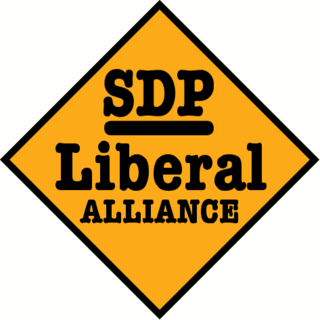
The SDP–Liberal Alliance was a centrist and social liberal political and electoral alliance in the United Kingdom.
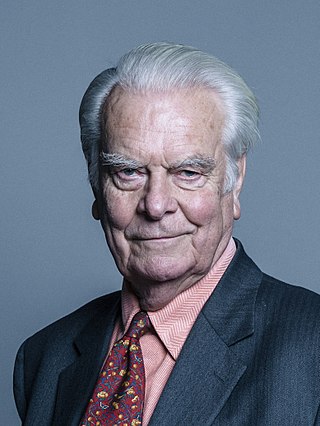
David Anthony Llewellyn Owen, Baron Owen, is a British politician and physician who served as Secretary of State for Foreign and Commonwealth Affairs as a Labour Party MP under James Callaghan from 1977 to 1979, and later led the Social Democratic Party (SDP). He was a Member of Parliament for 26 years, from 1966 to 1992.

David Martin Scott Steel, Baron Steel of Aikwood, is a retired Scottish politician. Elected as Member of Parliament for Roxburgh, Selkirk, and Peebles, followed by Tweeddale, Ettrick, and Lauderdale, he served as the final leader of the Liberal Party, from 1976 to 1988. His tenure spanned the duration of the alliance with the Social Democratic Party, which began in 1981 and concluded with the formation of the Liberal Democrats in 1988.

The Liberal Party is a liberal political party in the United Kingdom that was founded in 1989 as a continuation of the original Liberal Party by members who opposed its merger with the Social Democratic Party (SDP) to form the Liberal Democrats. The party holds six local council seats. The party promotes a hybrid of both classical and social liberal tendencies.

David Charles Penhaligon was a British politician from Cornwall who was Liberal Member of Parliament for Truro from October 1974 until his death in 1986. He was a popular figure in all parties, and was seen by many as a potential future front-runner for the party leadership until his sudden death in a car accident. In 2014 a Crowdfunder campaign was launched to record his life's work and impact.
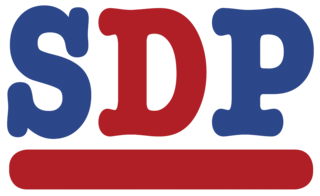
The Social Democratic Party (SDP) formed in 1988 was a political party in the United Kingdom led by David Owen, which lasted for only two years. A successor party to the original Social Democratic Party (SDP), it was known informally as the 'continuing' SDP.
The 1988 Social and Liberal Democrats leadership election was called following the formation of the then Social and Liberal Democrats. It was intended to replace the two interim leaders, David Steel and Robert Maclennan, with a single figurehead better able to represent both the former members of the Liberal Party and of the Social Democratic Party.
The 1982 Social Democratic Party leadership election was called following the formation of the Social Democratic Party (SDP). The party had been founded by the Gang of Four the previous year and had rapidly built up its membership, but lacked a formal leadership structure. Each of the Gang of Four was regarded as coequal leader.
The Scottish Liberal Democrats is a liberal, federalist political party in Scotland, part of UK Liberal Democrats. The party holds 4 of the 129 seats in the Scottish Parliament and 6 of the 57 Scottish seats in the House of Commons.

The Liberal Democrats are a political party in the United Kingdom. Party members elect the leader of the Liberal Democrats, the head and highest-ranking member of the party. Liberal Democrat members of Parliament also elect a deputy leader of the Parliamentary Party in the House of Commons, often colloquially referred to as the deputy leader. Under the federal constitution of the Liberal Democrats the leader is required to be a member of the House of Commons.
The Liberal Party was formally established in 1859 and existed until merging with the Social Democratic Party in 1988 to create the Liberal Democrats. Jack Clarke
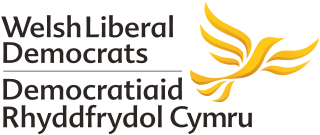
The Welsh Liberal Democrats is a liberal, federalist political party in Wales, part of UK Liberal Democrats. The party is led by Jane Dodds, who has served as an MS for Mid and West Wales since May 2021. The party currently has one elected member in the Senedd and one Welsh seat in the UK House of Commons. It also has several members of the House of Lords. The party had 69 local councillors serving in principal authorities as of the 2022 local authority elections, up 10 from 2017.
National League of Young Liberals (NLYL), often just called the Young Liberals, was the youth wing of the British Liberal Party. It was in existence from 1903 to 1990. Together with the party's student wing, the Union of Liberal Students (ULS), the organisations made up the Young Liberal Movement. In 1988, the ULS merged with the Social Democratic Party's own student wing, and in 1990 the youth and student sections themselves merged to form Liberal Democrat Youth and Students (LDYS). It was renamed Liberal Youth in Spring 2008, and then as Young Liberals in December 2016. The NLYL played a significant role in the development of Liberal thought and action, particularly from the 1960s until the end of the 1980s.

The Liberal Democrats are a liberal political party in the United Kingdom, founded in 1988. The current leader of the party is Ed Davey. They are the third-largest party in the United Kingdom, with 72 members of Parliament (MPs) in the House of Commons. They have 78 members of the House of Lords, four members of the Scottish Parliament, one member in the Welsh Senedd, and more than 3,000 local council seats. The party holds a twice-per-year Liberal Democrat Conference, at which party policy is formulated. In contrast to its main opponents' rules, the Liberal Democrats grant all members attending its Conference the right to vote on party policy, under a one member, one vote system. The party also allows its members to vote online for its policies and in the election of a new leader.
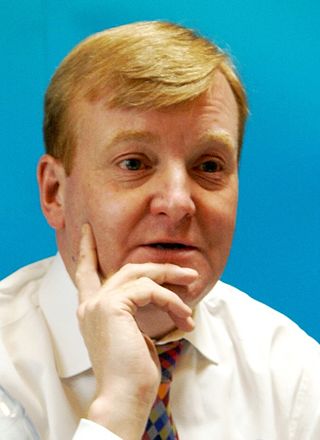
Charles Peter Kennedy was a British politician who served as Leader of the Liberal Democrats from 1999 to 2006, and was the Member of Parliament (MP) for Ross, Skye and Lochaber from 1983 to 2015.
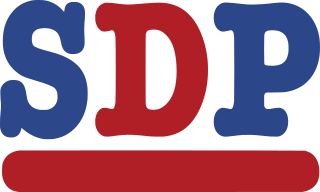
The Social Democratic Party (SDP) was a centrist to centre-left political party in the United Kingdom. The party supported a mixed economy, electoral reform, European integration and a decentralised state while rejecting the possibility of trade unions being overly influential within industrial relations. The SDP officially advocated social democracy, and unofficially for social liberalism as well.